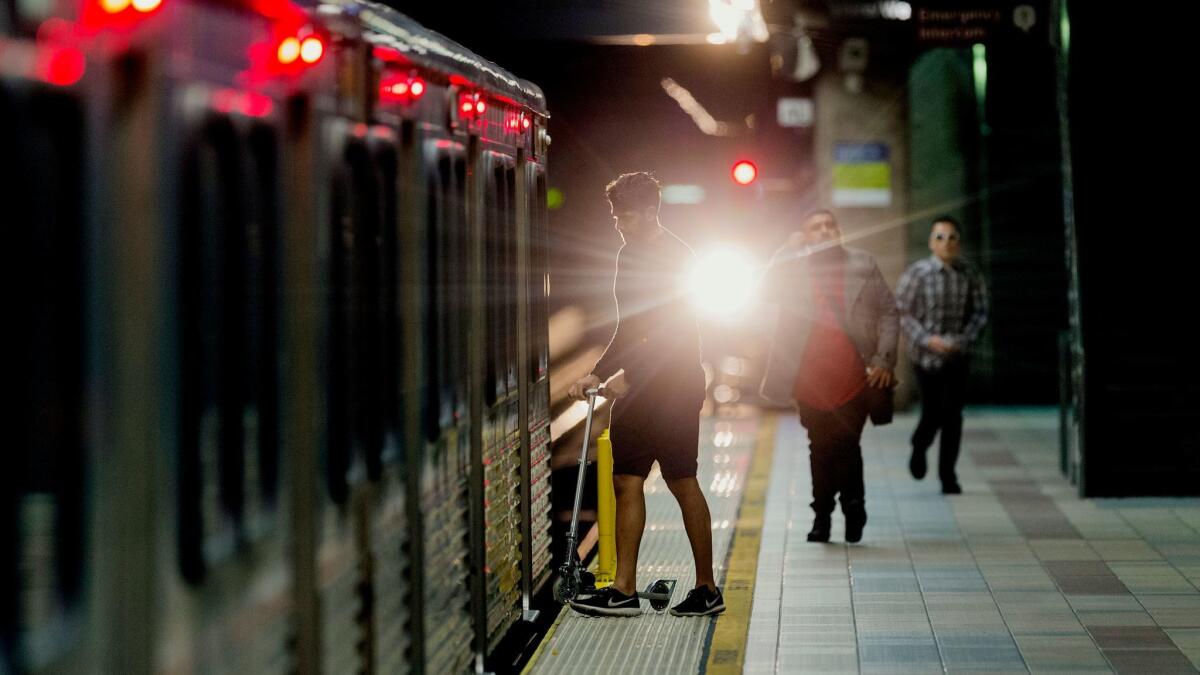L.A. Metro launches hotline for transit riders who have been harassed

Los Angeles County transportation officials Wednesday launched a 24-hour hotline for riders who are harassed or assaulted on buses and trains.
The hotline is part of a larger Metropolitan Transportation Authority effort to reduce harassment and improve perceptions of safety on L.A.’s sprawling bus and rail system. Some officials have suggested those issues could be contributing to Metro’s falling ridership.
The hotline, (844) OFF-LIMITS (633-5464), will be staffed by trained counselors from the nonprofit social justice group Peace Over Violence. Free counseling will be provided in English and Spanish.
“Riding the bus to work is not an invitation,” Patti Giggans, the group’s executive director, said at a news conference at Union Station. “Taking the subway to school is not an invitation. Whatever you’re wearing to go from Point A to Point B is not an invitation, nor is it an excuse, to sexually harass.”
In a recent survey, 29% of former passengers told Metro that they had stopped taking public transportation because they felt unsafe. Another survey found that 1 in 14 riders had been fondled or groped.
In 2014, when Metro first began tracking sexual harassment during regular surveys of thousands of riders, 22% of respondents said they had experienced some form of “unwanted sexual behavior” while riding.
That rate is now lower, but officials said Wednesday the new data were not ready to be released publicly.
Calling the hotline is not a substitute for filing a police report, Metro officials emphasized. Each report will help law enforcement officials track down repeat offenders and make the system safer, they said.
Metro passengers who experience or observe harassment can make a report by calling (888) 950-SAFE (7233) or 911, or by using the Transit Watch app.
If callers want to file a police report, counselors can explain the process and accompany a victim to a police station, Giggans said. But, she added, if a caller seems uncomfortable, they won’t press the issue.
In the past, transit officials have expressed concern that the vast majority of harassment on Metro appears to have gone unreported.
In 2014, when 22% of surveyed riders reported some form of unwanted attention on transit, the Sheriff’s Department received just 99 reports of indecent exposure and harassment.
“Everyone should know that help is only a phone call or an app away,” Metro director Jacquelyn Dupont Walker said.
Still, there are areas in the system where a phone call isn’t possible. Riders who use Verizon, Sprint and T-Mobile can now make calls and access WiFi in downtown Los Angeles subway tunnels, but the rest of the system is still a dead zone.
Chief Executive Phil Washington said Metro is making “tremendous” progress working with service providers to install routers and other equipment necessary to switch on WiFi and cellular data in the tunnels.
He added that those features will be provided when service begins on three lines under construction through downtown, South L.A., and Mid-City.
A one-year trial run of the harassment hotline will cost Metro $160,000, and the service could be renewed if it is used frequently, Giggans said.
For more transportation news, follow @laura_nelson on Twitter.
More to Read
Sign up for Essential California
The most important California stories and recommendations in your inbox every morning.
You may occasionally receive promotional content from the Los Angeles Times.











